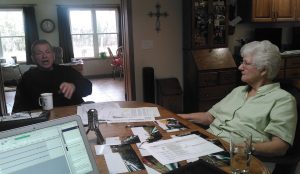
In Dakota Free Press Podcast #021, I hit the road for Marshall County to take a look at the Keystone pipeline oil spill. Nobody on the oily ground for TransCanada wanted to talk to me today. But landowners Lillian Anderson and Kent Moeckly did. Both long-time farmers in Marshall County, both with land crossed by the pipeline, Anderson and Moeckly had a lot to say about how TransCanada has treated them in the past, what they see happening now around the spill, and what they want to see in the future from South Dakota’s elected officials to protect landowners from further pipeliner predations.
Support independent local journalism online: ring the Dakota Free Press Tip Jar today!
This podcast is well worth the 42 minutes.
The ripple affects of Keystone XL and all pipelines is deplorable.
Once all the pipelines are built, there wont’ be any more need for more pipelines, right?
I am going to try and listen to Mr. H’s pod casting tomorrow before lunchtime arrives, but I keep in mind that even Beatle cars rely on pipelines and I have night horrors about flaming train wrecks.
Thanks, Roger!
Grudz, that timeline is about right. The oil companies will seize land and build pipes as long as there’s a business case for them.
Amherst-area retired farmer Don Tisher shrugs at the oil spill (“Accidents happen”) and tells KSFY, ““It’s nothing that won’t be taken care of efficiently and good…. I’m not going to live long enough to not need gas and oil and fuel and this is the safest, the most economical way of transporting it.” Don and Grudz might not live that long, but I might.
The plat map I got from Moeckly and Anderson yesterday shows the quarter where the spill took place is owned by Bill Tisher, who in 2007 firmly opposed having the pipeline run through his land.